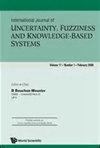全局优化与工程约束问题的动态多群竞争烟花算法
IF 1
4区 计算机科学
Q4 COMPUTER SCIENCE, ARTIFICIAL INTELLIGENCE
International Journal of Uncertainty Fuzziness and Knowledge-Based Systems
Pub Date : 2023-08-01
DOI:10.1142/s0218488523500290
引用次数: 0
摘要
烟花算法(fireworks algorithm, FWA)作为一种新型的智能算法,被用于处理不同类型的优化问题。由于FWA的搜索过程相对简单,因此效率较低。为了提高动态多群竞争烟花算法的搜索能力,提出了一种动态多群竞争烟花算法(DMCFWA)。首先,在利用最优烟花适应度值更新尺度系数的基础上,提出动态爆炸幅度策略,提高最优烟花的搜索能力;其次,利用烟花爆竹的位置信息,设计一种改进的搜索方法,增强烟花爆竹群的局部搜索能力;再次,采用多群独立选择技术和重新启动操作,提高了全局勘探和局部开采的能力;最后,为了降低FWA的计算成本,采用了一种新的初始化方法,并在DMCFWA中嵌入了新的火花数计算模型。通过采用这些策略,DMCFWA易于实现,具有良好的开发勘探效果。采用CEC2017测试套件和4个工程约束问题验证了DMCFWA的性能。实验结果表明,DMCFWA比竞争对手的性能更有效、更稳定。本文章由计算机程序翻译,如有差异,请以英文原文为准。
Dynamic Multi-Swarm Competitive Fireworks Algorithm for Global Optimization and Engineering Constraint Problems
As a novel intelligent algorithm, fireworks algorithm (FWA) is applied to deal with different types of optimization problems. Since FWA’s search processes are relatively simple, it is inefficient. In this paper, a dynamic multi-swarm competitive fireworks algorithm (DMCFWA) is developed to enhance the search capability of FWA. Firstly, based on the scaling coefficient updated by utilizing the fitness value of the optimal firework, the dynamic explosion amplitude strategy is proposed to improve the search capability of the best firework. Secondly, utilizing the location information of the fireworks, an improved search method is designed to enhance the local search capability of firework swarms. Thirdly, a multi-swarm independent selection technique and a restart operation are adopted to boost its abilities of global exploration and local exploitation. Finally, to reduce the computational cost of FWA, a new initialization method is used and a new model for calculating the spark number is embedded in DMCFWA. By adopting these strategies, DMCFWA easily implements and does well in exploitation and exploration. CEC2017 test suite and four engineering constraint problems are used to demonstrate the performance of DMCFWA. Experimental results show that DMCFWA performs more effectively and stably than its competitors.
求助全文
通过发布文献求助,成功后即可免费获取论文全文。
去求助
来源期刊
CiteScore
2.70
自引率
0.00%
发文量
48
审稿时长
13.5 months
期刊介绍:
The International Journal of Uncertainty, Fuzziness and Knowledge-Based Systems is a forum for research on various methodologies for the management of imprecise, vague, uncertain or incomplete information. The aim of the journal is to promote theoretical or methodological works dealing with all kinds of methods to represent and manipulate imperfectly described pieces of knowledge, excluding results on pure mathematics or simple applications of existing theoretical results. It is published bimonthly, with worldwide distribution to researchers, engineers, decision-makers, and educators.

 求助内容:
求助内容: 应助结果提醒方式:
应助结果提醒方式:


